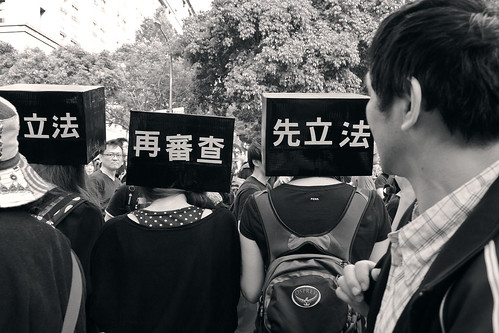Read an eBook about the last 21 hours of the Sunflower Movement occupancy.
 The Sunflower movement made history this month. As Taiwan’s government was deviating from the will of its people, unarmed students disrupted the legislature by occupying it for three weeks. An unplanned, flash-mob protest met outside the legislature on March 18. Both the students and the legislature’s Speaker, Wang Jin-pyng, took peaceful action and the situation resolved without violence. Wang promised to require transparency for any future trade agreements and the students promised to leave peacefully. After three weeks, the students kept their promise, leaving only a sign translated “Congress of the People” at the front of the chamber and, on the Speaker’s desk, a widely used academic book from the late 19th century with collection of stories on political corruption.
The Sunflower movement made history this month. As Taiwan’s government was deviating from the will of its people, unarmed students disrupted the legislature by occupying it for three weeks. An unplanned, flash-mob protest met outside the legislature on March 18. Both the students and the legislature’s Speaker, Wang Jin-pyng, took peaceful action and the situation resolved without violence. Wang promised to require transparency for any future trade agreements and the students promised to leave peacefully. After three weeks, the students kept their promise, leaving only a sign translated “Congress of the People” at the front of the chamber and, on the Speaker’s desk, a widely used academic book from the late 19th century with collection of stories on political corruption.
Now, non-violent protesters who highlight “Constitutional compliance”, “individual liberty”, and “national sovereignty” have proven that they can remain non-violent, if the police do not use force to remove them. · · · →


